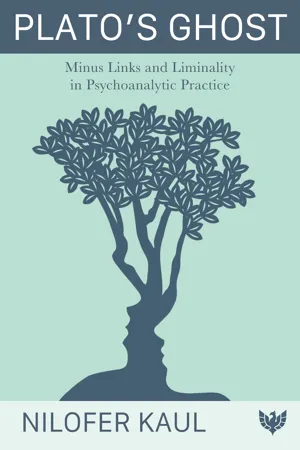
- 246 pages
- English
- ePUB (mobile friendly)
- Available on iOS & Android
About this book
Psychoanalytic encounters are filled with the unknowability of two unconscious minds meeting. Here one may forge a link that enables the process of meaning-making, or else it can become the space for destruction, perversion, evacuation, regression, and stasis. The area that lies between the mind of the analyst and that of the analysand is thus the liminal area of psychoanalysis – of growth, change, turbulence, as well as that of impasse, bastion, and failure. This latter could be what Bion meant by minus links.
It seems that the primitive part of the mind is always looking for ways to evade psychic pain and emotional truth is always in peril. Analytic links are always fraught with danger. Minus links share with each other the quality of evading truth and therefore inhibiting emotional growth and the capacity to give meaning to experiences. Blind spots may be enabled by analytic allegiance to our particular schools, our inability to forge a technique in the face of the protomental apparatus which can breed arrogance, the complacencies of language, gaps between our theoretical allegiance and our technique, and, finally, all too often, our unwillingness and inability to get in touch with our true experience. Would it help to chronicle our quotidian failures?
In these liminal moments, the links between analyst and analysand slide away from the emotional truth, rather than towards it. Nilofer Kaul presents these moments and explores the complex reasons behind them in a stunning debut work that questions the heart of analytic practice.
Frequently asked questions
- Essential is ideal for learners and professionals who enjoy exploring a wide range of subjects. Access the Essential Library with 800,000+ trusted titles and best-sellers across business, personal growth, and the humanities. Includes unlimited reading time and Standard Read Aloud voice.
- Complete: Perfect for advanced learners and researchers needing full, unrestricted access. Unlock 1.4M+ books across hundreds of subjects, including academic and specialized titles. The Complete Plan also includes advanced features like Premium Read Aloud and Research Assistant.
Please note we cannot support devices running on iOS 13 and Android 7 or earlier. Learn more about using the app.
Information
Table of contents
- Cover Page
- Half Title
- Full Title
- Copyright
- Dedication
- Contents
- Acknowledgements
- About the author
- Prologue
- Introduction
- Part I: Language
- Part II: Vertices
- Epilogue
- References
- Index